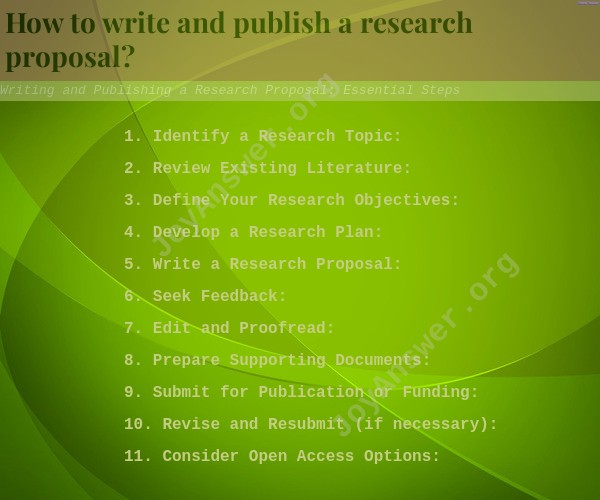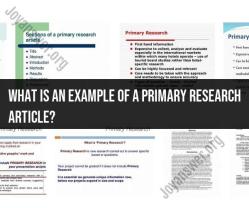How to write and publish a research proposal?
Writing and publishing a research proposal involves several essential steps, whether you intend to submit it for funding, academic evaluation, or as a preliminary step to a research project. Below is a step-by-step guide on how to write and publish a research proposal:
1. Identify a Research Topic:
- Begin by selecting a research topic that interests you and is relevant to your field of study. Ensure that the topic is well-defined and has a clear research question or objective.
2. Review Existing Literature:
- Conduct a comprehensive literature review to understand the current state of research in your chosen area. Identify gaps, unresolved questions, or areas where further investigation is needed.
3. Define Your Research Objectives:
- Clearly state the objectives or research questions you aim to address in your proposal. Your objectives should be specific, measurable, achievable, relevant, and time-bound (SMART).
4. Develop a Research Plan:
- Outline your research plan, including the methodology you intend to use, data collection methods, and data analysis techniques. Explain how your research will be conducted step by step.
5. Write a Research Proposal:
- Write your research proposal following a standard structure, which typically includes:
- Title: A concise and descriptive title for your proposal.
- Introduction: Provide background information, the rationale for your research, and the significance of the study.
- Literature Review: Summarize relevant literature and highlight the gaps or problems that your research will address.
- Research Objectives or Hypotheses: Clearly state your research objectives or hypotheses.
- Methodology: Describe your research design, data collection methods, and data analysis techniques.
- Timeline: Present a schedule or timeline for your research.
- References: Cite all sources used in your proposal.
6. Seek Feedback:
- Share your research proposal with mentors, advisors, or colleagues for feedback and suggestions. Their insights can help improve the quality of your proposal.
7. Edit and Proofread:
- Carefully edit and proofread your research proposal to eliminate grammatical errors, improve clarity, and ensure it adheres to formatting and citation guidelines.
8. Prepare Supporting Documents:
- Depending on the publication or submission requirements, you may need to include additional documents such as a cover letter, CV, and letters of recommendation.
9. Submit for Publication or Funding:
- If you intend to publish your research proposal, look for suitable academic journals, conference proceedings, or funding agencies that accept research proposals. Follow their submission guidelines and procedures.
10. Revise and Resubmit (if necessary):- Be prepared for possible revisions or feedback from reviewers. Address any comments or concerns raised by the reviewers and resubmit your proposal as required.
11. Consider Open Access Options:- If you want your research proposal to be widely accessible, consider publishing it in an open-access journal or repository. This can increase the visibility and impact of your work.
12. Copyright and Licensing:- Be mindful of copyright and licensing agreements when publishing your research proposal. Understand the terms and conditions of the publication platform you choose.
13. Promote Your Research:- Once your research proposal is published, promote it through academic and social media channels to reach a wider audience and engage with other researchers in your field.
14. Track Impact:- Monitor the impact of your published research proposal by tracking citations, downloads, or any other relevant metrics. This information can help you assess its influence and reach.
Publishing a research proposal can be a valuable way to share your research ideas, seek feedback, and establish your presence in your academic or research community. It can also be a stepping stone toward securing funding and support for your research project.
Crafting a Research Proposal: Steps to Write and Publish
Writing a research proposal can be a daunting task, but it is an essential step in the research process. A well-written research proposal will help you to clarify your research question, develop a sound methodology, and secure funding for your research.
Here are some steps to follow when crafting a research proposal:
- Identify your research question. What do you want to learn? What specific hypotheses or questions are you testing?
- Review the literature. What has already been written on your research topic? What are the gaps in the literature?
- Develop a research design. What type of research will you be conducting? What methods will you use to collect and analyze your data?
- Write your proposal. Be sure to include the following sections: introduction, literature review, research design, methodology, data analysis plan, and ethical considerations.
- Get feedback on your proposal. Ask colleagues, mentors, or other experts to review your proposal and provide feedback.
- Revise and submit your proposal. Once you have incorporated feedback, revise your proposal and submit it to your funding agency or institution.
Research Proposal Writing: Guidelines for a Successful Publication
Once you have written a research proposal, you may want to consider publishing it in a peer-reviewed journal. This can be a great way to share your research with the academic community and to gain recognition for your work.
Here are some guidelines for writing a research proposal that is publishable:
- Make sure your research question is original and significant.
- Conduct a thorough review of the literature and demonstrate your understanding of the field.
- Develop a sound research design and methodology.
- Write clearly and concisely.
- Proofread your proposal carefully before submitting it.
From Idea to Publication: The Process of Writing a Research Proposal
The process of writing a research proposal can be divided into three main stages:
- Prewriting: This stage involves identifying your research question, reviewing the literature, and developing a research design.
- Writing: This stage involves drafting your proposal and revising it based on feedback.
- Submission: This stage involves submitting your proposal to your funding agency or institution.
Here are some tips for each stage of the process:
Prewriting:
- Brainstorm potential research questions. What are you curious about? What problems would you like to solve?
- Narrow down your topic. Once you have a list of potential research questions, choose one that is specific and feasible.
- Review the literature. Read academic articles, books, and other sources on your research topic. This will help you to understand the current state of the field and to identify gaps in the literature.
- Develop a research design. What type of research will you be conducting? What methods will you use to collect and analyze your data?
Writing:
- Start with a strong introduction. Your introduction should clearly state your research question and explain why your research is important.
- Review the literature in detail. Provide a comprehensive overview of the relevant literature and explain how your research will contribute to the field.
- Describe your research design and methodology. Be clear and concise in your description of how you will collect and analyze your data.
- Discuss your ethical considerations. What ethical considerations are relevant to your study? How will you address these considerations?
- Write a strong conclusion. Restate your research question and summarize your main points.
Submission:
- Submit your proposal to the appropriate funding agency or institution. Be sure to read the submission guidelines carefully before submitting your proposal.
- Follow up with the funding agency or institution. If you do not hear back from the funding agency or institution within a reasonable amount of time, follow up with them to inquire about the status of your proposal.
Writing a research proposal can be challenging, but it is an important step in the research process. By following the tips above, you can write a strong research proposal that will help you to secure funding and publish your work.












